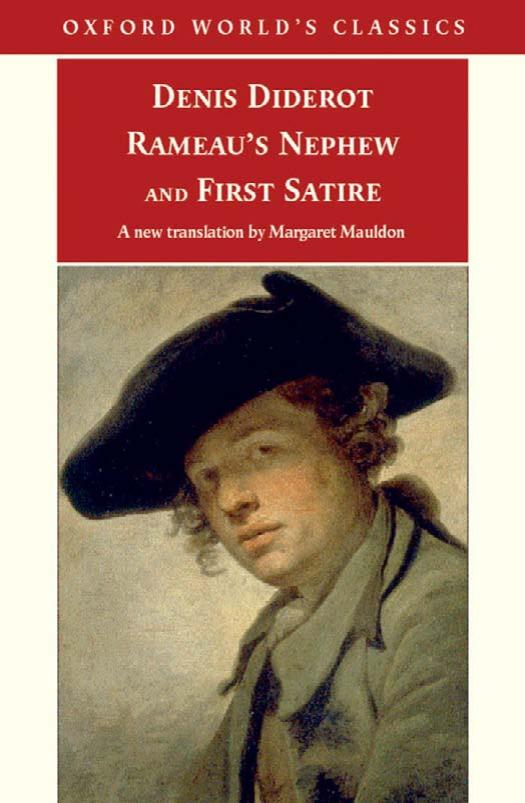Rameau's Nephew and First Satire (Oxford World's Classics) by Denis Diderot

Author:Denis Diderot [Diderot, Denis]
Language: eng
Format: epub, pdf
Publisher: Oxford University Press
Published: 2006-11-09T05:00:00+00:00
FIRST SATIRE
Quot capitum vivunt, totidem capitum milia
(HORACE, Satires, II. i)*
TO MY FRIEND, MONSIEUR NAIGEON
ON A PASSAGE FROM THE
FIRST SATIRE OF HORACE’S SECOND BOOK:
Sunt quibus in Satyra videor nimis acer et ultra
Legem tendere opus.*
FIRST SATIRE
MY friend, have you not observed that reason, the prerogative peculiar to us humans, takes such a range of forms that within it alone we find parallels to every variation of instinct in animals? Consequently, there is no animal, whether benign or harmful, anywhere in the sky, the forest, or the waters of the earth, which you cannot recognize in the biped figure of man. There’s the man wolf, the man tiger, the man fox, the man mole, the man hog, the man sheep—and this last is the commonest. There’s the man eel—grasp him as firmly as you can, he will escape you; the man pike, who devours everything; the man snake, who twists himself into a hundred different shapes; the man bear, whom I find not unpleasing; the man eagle, soaring high in the skies above us; the man crow; the man sparrow-hawk; the man, and the bird, of prey. Nothing is rarer than a man who is wholly a man; there’s not one of us without a trace of his animal counterpart.
Therefore, for every man, there’s a different cry.
There’s nature’s cry, which I hear in what Sara says of the sacrifice of her son: God would never have asked it of his mother.* And when Fontenelle, witness to the advance of unbelief, declared: I’d very much like to be here sixty years from now, to see what comes of this,* Of course he wanted to be here. We do not want to die, and the end always comes a day too soon. In one more day we’d have discovered the squaring of the circle.
Why should this cry of nature, which is peculiar to us, be so rare in the imitative arts? Why is it that the poet who captures it amazes and transports us? Might it be because he thereby reveals to us the secret of our hearts?
There’s the cry of passion, which I hear when Hermione asks Oreste: Who told you so? and when Phèdre, responding to: They’ll never meet again, says: They’ll love one another forever,* I hear it as I depart after an eloquent sermon on almsgiving, in the mutterings of the miser at my side: That makes one wish one were a beggar; or again, when the faithless mistress, surprised by her lover in flagrante delicto, reproaches him: Ah, you no longer love me, for you’d rather believe what you’ve seen than what I tell you; and yet again, in the remark of the dying usurer to the priest who exhorts him to repent: This crucifix, I couldn’t in good conscience lend more than a hundred écus on it, and then only with a note of hand.
There was a time when I loved the theatre, particularly the opera. I was at the Opéra one evening, seated between the Abbé de Canaye,
Download
Rameau's Nephew and First Satire (Oxford World's Classics) by Denis Diderot.pdf
This site does not store any files on its server. We only index and link to content provided by other sites. Please contact the content providers to delete copyright contents if any and email us, we'll remove relevant links or contents immediately.
| Coloring Books for Grown-Ups | Humor |
| Movies | Performing Arts |
| Pop Culture | Puzzles & Games |
| Radio | Sheet Music & Scores |
| Television | Trivia & Fun Facts |
Spell It Out by David Crystal(36110)
Professional Troublemaker by Luvvie Ajayi Jones(29651)
The Secret History by Donna Tartt(19052)
We're Going to Need More Wine by Gabrielle Union(19034)
Cat's cradle by Kurt Vonnegut(15335)
The Goal (Off-Campus #4) by Elle Kennedy(13657)
The Social Justice Warrior Handbook by Lisa De Pasquale(12187)
The Break by Marian Keyes(9358)
Crazy Rich Asians by Kevin Kwan(9277)
The remains of the day by Kazuo Ishiguro(8975)
Thirteen Reasons Why by Jay Asher(8893)
Educated by Tara Westover(8045)
The handmaid's tale by Margaret Atwood(7757)
Giovanni's Room by James Baldwin(7329)
Win Bigly by Scott Adams(7184)
This Is How You Lose Her by Junot Diaz(6877)
The Rosie Project by Graeme Simsion(6378)
Six Wakes by Mur Lafferty(6239)
The Power of Now: A Guide to Spiritual Enlightenment by Eckhart Tolle(5754)
